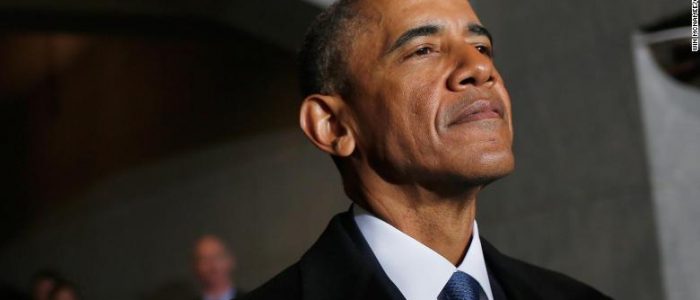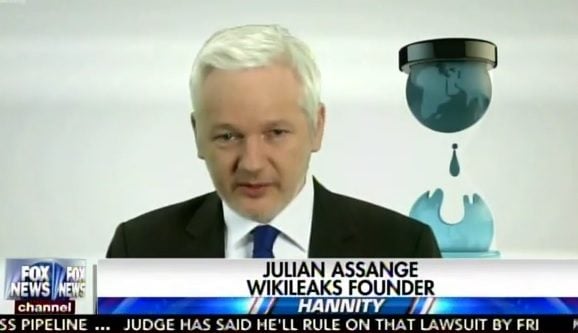ויקיליקס: אובמה הורה ל- CIA לרגל גם אחר מועמדי הבחירות לנשיאות צרפת

כל התוכן באתר הוא בגדר לכאורה…
-
מסמך ויקיליקס: אובמה הורה ל- CIA לרגל גם אחר מועמדים בבחירות לנשיאות צרפת
-
זו ההתערבות השלישית של אובמה בבחירות של מדינה זרה אחר משאל ה״ברקזיט״ בבריטניה והבחירות בישראל
מייסד ויקיליקס, ג'וליאן אסאנג' השיב לציוץ של טראמפ האומר:
"ספייגייט יכולה להיות אחת השערוריות הפוליטיות הגדולות בהיסטוריה!"
SPYGATE could be one of the biggest political scandals in history!
— Donald J. Trump (@realDonaldTrump) May 23, 2018
בתגובה לציוץ, ויקיליקס הבטיח לנשיא טראמפ כי הוא אינו המועמד לנשיאות הראשון שסומן כמטרה:
״אובמה כבר עשה זאת לצרפתים״ בצירוף קישור למסמך של ה- CIA, ובו הוראות ריגול כנגד מארי לאפן ומועמדים אחרים לנשיאות צרפת.
Obama already did it to the French https://t.co/1oIteRNEQe
— WikiLeaks (@wikileaks) May 23, 2018
זה אומר, כמובן, שזו ההתערבות השלישית (הידועה לנו) של אובמה בבחירות של מדינה זרה
בחודש אפריל 2016, הנשיא אובמה אמר לבוחרים הבריטים כי מוטב להם לא להצביע בעד ברקזיט – משאל העם של בריטניה לפרוש מהאיחוד האירופי – או שהם ימצאו את עצמם "בחלק האחורי של התור" בכל הקשור לעסקאות סחר עם ארצות הברית:
זו לא היתה הפעם הראשונה שממשל אובמה ניסה לקבוע את תוצאות הבחירות במדינות זרות. בבחירות האחרונות, מחלקת המדינה של אובמה העבירה מאות אלפי דולרים ממשלם המסים האמריקני לאופוזיציה של ראש ממשלת ישראל, בנימין נתניהו. ועדת המשנה של הסנאט מצאה כי מחלקת המדינה וקבוצה בשם "קול אחד" (V15) תיאמו פעילויות פוליטיות – כולל בניית מאגר בוחרים, הכשרת פעילים, ושכירת חברת ייעוץ פוליטית הקשורה לנשיא אובמה עצמו.

RELEASE: Full text of CIA orders targetting French presidential election including Hollande, Sarkozy & Le Pen https://t.co/BUrH14uePb pic.twitter.com/I4TDfbCvYA
— WikiLeaks (@wikileaks) February 16, 2017
להלן קטע מתוך ההוכחות שסיפק אסאנג׳ במסמך ויקיליקס לפעילות ריגול ה- CIA של אובמה
The CIA espionage orders published today are classified and restricted to U.S. eyes only (“NOFORN”) due to “Friends-on-Friends sensitivities”. The orders state that the collected information is to “support” the activities of the CIA, the Defence Intelligence Agency (DIA)’s E.U section, and the U.S. State Department’s Intelligence and Research Branch.
The CIA operation ran for ten months from 21 Nov 2011 to 29 Sep 2012, crossing the April-May 2012 French presidential election and several months into the formation of the new government.
All major French political parties were targeted for infiltration by the CIA’s human (“HUMINT”) and electronic (“SIGINT”) spies in the seven months leading up to France’s 2012 presidential election. The revelations are contained within three CIA tasking orders published today by WikiLeaks as context for its forth coming CIA Vault 7 series. Named specifically as targets are the French Socialist Party (PS), the National Front (FN) and Union for a Popular Movement (UMP) together with current President Francois Hollande, then President Nicolas Sarkozy, current round one presidential front runner Marine Le Pen, and former presidential candidates Martine Aubry and Dominique Strauss-Khan.
The CIA assessed that President Sarkozy’s party was not assured re-election. Specific tasking concerning his party included obtaining the “Strategic Election Plans” of the Union for a Popular Movement (UMP); schisms or alliances developing in the UMP elite; private UMP reactions to Sarkozy’s campaign stratagies; discussions within the UMP on any “perceived vulnerabilities to maintaining power” after the election; efforts to change the party’s ideological mission; and discussions about Sarkozy’s support for the UMP and “the value he places on the continuation of the party’s dominance”. Specific instructions tasked CIA officers to discover Sarkozy’s private deliberations “on the other candidates” as well as how he interacted with his advisors. Sarkozy’s earlier self-identification as “Sarkozy the American” did not protect him from US espionage in the 2012 election or during his presidency.
The espionage order for “Non Ruling Political Parties and Candidates Strategic Election Plans” which targeted Francois Holland, Marine Le Pen and other opposition figures requires obtaining opposition parties’ strategies for the election; information on internal party dynamics and rising leaders; efforts to influence and implement political decisions; support from local government officials, government elites or business elites; views of the United States; efforts to reach out to other countries, including Germany, U.K., Libya, Israel, Palestine, Syria & Cote d’Ivoire; as well as information about party and candidate funding.
